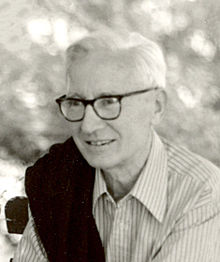
Back نيكولاس تينبرخن Arabic نيكولاس تينبرجن ARZ نیکولاس تینبرقن AZB Нікалас Тынберген Byelorussian Николас Тинберген Bulgarian Nikolaas Tinbergen Catalan نیکۆلاس تێنبەرگین CKB Nikolaas Tinbergen Czech Niko Tinbergen Welsh Nikolaas Tinbergen German
Niko Tinbergen | |
|---|---|
 Tinbergen in 1978 | |
| Born | Nikolaas Tinbergen 15 April 1907 The Hague, Netherlands |
| Died | 21 December 1988 (aged 81) Oxford, England |
| Alma mater | Leiden University |
| Known for |
|
| Spouse | Elisabeth Rutten (1912–1990) |
| Children | 5 |
| Awards |
|
| Scientific career | |
| Fields | |
| Institutions | University of Oxford |
| Doctoral advisor | Hilbrand Boschma[2] |
| Doctoral students | |
Nikolaas "Niko" Tinbergen FRS[1] (/ˈtɪnbɜːrɡən/ TIN-bur-gən, Dutch: [ˈnikoː(laːs) ˈtɪmbɛrɣə(n)]; 15 April 1907 – 21 December 1988) was a Dutch biologist and ornithologist who shared the 1973 Nobel Prize in Physiology or Medicine with Karl von Frisch and Konrad Lorenz[7][8][9][10][11] for their discoveries concerning the organization and elicitation of individual and social behavior patterns in animals. He is regarded as one of the founders of modern ethology, the study of animal behavior.
In 1951, he published The Study of Instinct, an influential book on animal behaviour. In the 1960s, he collaborated with filmmaker Hugh Falkus on a series of wildlife films, including The Riddle of the Rook (1972) and Signals for Survival (1969), which won the Italia prize in that year and the American blue ribbon in 1971.
- ^ a b Hinde, Robert A. (1990). "Nikolaas Tinbergen. 15 April 1907 – 21 December 1988". Biographical Memoirs of Fellows of the Royal Society. 36: 547–565. doi:10.1098/rsbm.1990.0043.
- ^ Burkhardt, R. W. Jr. (2010). "Niko Tinbergen" (PDF). Elsevier. pp. 428–433. Retrieved 8 October 2016.
- ^ Dawkins, Marian (1970). The Mechanism of Hunting by 'Searching Image' in Birds. jisc.ac.uk (DPhil thesis). University of Oxford. EThOS uk.bl.ethos.453252. Archived from the original on 12 September 2018. Retrieved 11 September 2018.
- ^ Dawkins, Clinton Richard (1966). Selective pecking in the domestic chick. bodleian.ox.ac.uk (DPhil thesis). University of Oxford. EThOS uk.bl.ethos.710826.
- ^ "Aubrey Manning". University of Edinburgh. Retrieved 8 October 2016.
- ^ Beale, Graeme Robert (2009). Tinbergian Practice, themes and variations: the field and laboratory methods and practice of the Animal Behaviour Research Group under Nikolaas Tinbergen at Oxford University. University of Edinburgh (PhD Thesis). hdl:1842/4103?show=full.
- ^ Tinbergen autobiography at nobelprize.org
- ^ The Nobel Prize in Physiology or Medicine 1973: von Frisch, Lorenz and Tinbergen
- ^ Tinbergen Nobel Lecture
- ^ Dewsbury, D. A. (2003). "The 1973 Nobel Prize for Physiology or Medicine: Recognition for behavioral science?". American Psychologist. 58 (9): 747–752. doi:10.1037/0003-066X.58.9.747. PMID 14584992.
- ^ Raju, T. N. (1999). "The Nobel chronicles. 1973: Karl von Frisch (1886–1982); Konrad Lorenz (1903–89); and Nikolaas Tinbergen (1907–88)". Lancet. 354 (9184): 1130. doi:10.1016/s0140-6736(05)76931-2. PMID 10509540. S2CID 54236399.